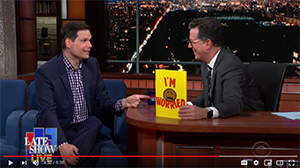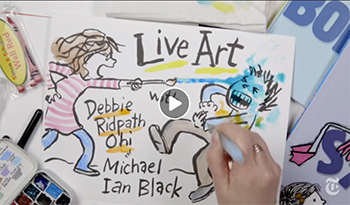Posted on  Monday, April 16, 2007 at 8:13AM
Monday, April 16, 2007 at 8:13AM
Should you wait for a convention to ask you to do a concert? What's the proper etiquette for asking? In general, concom-types seem to be open to filkers asking for concerts as long as you do so well in advance, politely, and without special demands. DON'T take it personally if you're turned down. And above all, do remember that filking isn't about concerts.
I loved Brenda Sutton's comment: "It's not supposed to be about the concerts and who has them. Filking is supposed to be about the joy of creating music with your friends. What I've noticed over all these mumbledy-mumble years is that, the folks who are really enjoying themselves, and who are really helping others to enjoy themselves as well, don't need concerts to have a good time... but they are the ones to eventually get concerts. Hmmmm. Hmmmmmm."
=========================================
From Mary Bertke (re: OVFF programming):
"Ask for a concert the year before. Don't wait until only three months before the concert to ask. I may make my schedule before other people, but due to Ren Faire, I like to have my schedule for OVFF pretty solid by early August at the very latest (and to me, that's really pushing late - unless I'm really tempted to cram something in, I want scheduling done by the beginning of July).
Give the person in charge of programming a CD - a burned-on-your-computer copy is just fine - with at least three songs of you performing to show them what you sound like. Remember - they may never have heard of you, or even if they've heard you, they may not remember due to con-induced sleep deprivation. Make sure appropriate contact information is included with the CD (Name, email, phone number, address).
Important: once you've been offered a concert, be gracious and helpful. DO NOT:
- Complain about the time slot you've been offered.
- Tell the programming coordinator that no one in their right mind would schedule things the way they have, and that you would do it much better.
- Attempt to make special demands.
- Complain that your concert is too short.
- Demand the programming coordinator take care of/find out for you things having to do with the hotel, registration, or anything outside the realm of programming.
While none of these will cause you to get the offer of a concert retracted, it will cause the coordinator to regret giving you a concert - a regret which will, most likely, be expressed to concoms of other conventions."
-----------------------------------
From Judith Hayman (re: FKO programming):
"I would agree with Mary on most everything she said but one... FKO doesn't have a programming head and ninety percent of our communication is filtered through the conchair. Even the person appointed to do the final coordination take suggestions to committee. Not all concoms work the same.
Asking for a concert:
Ask. Ask WELL ahead. Know that when you ask, you are really saying 'I'm coming to your con _anyway_. I am buying a membership. I am booking a hotel room and paying for transportation. Since I'm already doing that it would be cool to be able to play on stage'. Don't assume that the convention will comp your membership for a concert.
Also don't assume that by asking you will get one. Our con awards only two or three concert spots outside the guests. It's good to start by asking for only fifteen minutes. Go back and look at Erica's comments on balancing style, gender mix, local/distant, old fave/new wave.
Make sure you note added value: Debuting a new CD, taken on a new singing partner, batch of new material, learned a new instrument, baton twirling... (no, that's Christine Lavin)
Above all, ask nicely, and take being declined gracefully.
Advice:
If you have to ask for assistance with an instrument (borrowing an instrument locally) or other equipment, stop, think twice and try not to do that. The concom is busy trying to accommodate the guests flakey requests and don't need yours.
If you can't manage without help, ask for someone local who's NOT on concom who might be a resource.
If that fails make your request at least several months ahead. The last thing a committee needs is a request for an electronic keyboard left in e-mail two days pre-con. It happened and we said "no".
Don't be a prima donna. Word gets around. When concoms talk, they talk about who defaulted, who was unprepared, who was late, who was demanding. If you're asked to cut your set by a song, do it. Do it with a smile. If you're entertaining but hard to work with, you'll be tolerated. If you're entertaining and EASY to work with, you'll be in high demand. (I will not give an example of the former, but the owner of this list and her cohorts definitely fall into the latter category of both entertaining and blissfully easy to work with).
Remember that your half-hour set INCLUDES the set up and intro. It's really a 25 min set. If the sound team is slow it's a 20 min set.
And on the other side:
I also believe that cons have responsibilities toward concerts. Set the damn schedule early. At least select those for concerts and let them know that they will have one, with a rough time range. It takes hard work to prepare a good concert set. Not all of us like to go on stage without a set list.
Run as close to on time as you can (yes, actually that IS a comment about two of the filk cons). Being ready for a concert and having it delayed and delayed may mean the performer is so nervous s/he can't function. Or is hungry, overtired, upset, etc. Or gets their concert set cut short because some other event has to take place at a certain time. Some performers deal with this, many don't.
If possible offer comps for concerts. FKO doesn't because we simply cannot afford it, being smaller."
-----------------------------------
From Erica Neely (re: UK filk programming):
"Okay, I've done concom-y things for 2 UK filkcons, so I'll say a few things here.
Do you prefer filkers to wait to be invited?
Oh good god, no. I don't know who everyone is and I certainly don't remember everyone I *do* know at any given time. It's good to ask. You shouldn't wait to be invited. (Having said that, gentle nudging of your shy friends or mentioning to someone in programming 'have you heard X?' isn't bad either if it's low-key. Sometimes people need a little encouragement to do a concert. But it's much better if you try to encourage the people to volunteer rather than expect that programming people will be omniscient.)
What's the right way and wrong way to ask for a concert?
Ask politely and, if turned down, be gracious in accepting it. If you've done a lot of concerts at cons recently, realize that you may not get a spot at the con; most concoms strive for variety. This holds true of your 'local' con as well; you aren't entitled to a spot just because you're nearby. So, for instance, I've told the last few east coast cons that I'd love to do a spot if there's space, but I'm cool with not doing it as well, if they have other people they want to showcase; I've done a lot of concerts at east coast cons and I don't mind at all not getting one. Being easy-going is definitely a good thing.
Also, try not to take it too personally if you don't get a slot. You may be the best thing to come out of filk since Leslie Fish, but if you left it too late or if they're trying to balance certain criteria (gender mix, parody/serious mix, whatever), you may just not fit in this year. Being nice about the refusal makes it more likely that you'll get in next time.
I'm actually going to make a slight break with some of the previous comments and say that there's nothing wrong with indicating some general constraints on when you'd like a set - for instance, if you have small children and can't do much late-night stuff or if (like I used to be) you have stagefright so badly you really would prefer not to be directly after a meal because you won't be able to eat if you are...just be aware that a) you may not get your preference, b) that makes it somewhat less likely to get a spot, since there are fewer spots that you would fit in to, and c) again, be nice about asking. You are *requesting* accomodation. You should not be demanding it. And you should definitely request it in advance, preferably with an explanation as to why; the programming person will be much more likely to be able (and willing) to help you if she has prior notice (and a good reason!) than if it's last-minute.
Any other advice?
This isn't exactly advice, but I'll add it anyway. I have no idea what the periodicity of concerts at major American filkcons is. That is to say, if you've had a concert at OVFF or FKO or Consonance or whatever, I don't know how long should you wait before asking for another. I have performed at OVFF and FKO and I haven't asked to perform at either of those cons again because I have no idea how long I should wait before doing so. (Other than, in my book, longer than it's been so far. *grin*) There is definitely an art to making clear that you'd love to perform but won't be huffy if you don't get to and aren't trying to filkhog. I'd love to know what the committees for the cons think about this issue - and also how they find people for, say, performer's circles and other events that have multiple people sharing a spot (who aren't a rehearsed group like Urban Tapestry.)
Umm, I guess that wasn't a helpful answer, just a request for more info. Sorry!"
-----------------------------------
From Lissa Allcock (re: UK filk programming):
"For UK filk cons we usually put a call out in our first PR telling people to come sign up for concerts. Very occasionally we might ask people to do a concert (or ask them if they'd like to do one) but most of our spots are filled by volunteers. Then how long they get depends on how many volunteers we get. At 16 Tones we had several shocked people who found out a bit late in the day that they'd got an hour when they were expecting to get half an hour, but everyone coped heroically. I usually prefer to give people an hour if possible, but it depends on how much material they have (or are confident of).
When asking for a concert it helps to give an idea of how much time you want and what level of tech you need, how many people are in your group if you are a group etc, but that can be sorted out closer to the time too."
-----------------------------------
From Rob Wynne (re: GAfilk programming):
"Gafilk is a bit of an odd duck in this regard, because aside from the Guest concerts and the banquet, we only do *one* concert every year, and it is chosen by the concom from the attendees. So there really aren't any concert slots to ask for.
As for a good way to ask for them, my approach has always been the following:
'Just wanted you to know that I'm going to be attending $CON, and if there's anything I can do to help out with programming (concert, panels, etc), let me know.'
Which doesn't pressure them to give you a 'yes or no' answer, or make them feel like the only reason you're coming is to try and get an audience from them. but that's just my own personal opinion."
-----------------------------------
From Alan Thiesen (re: Consonance programming):
"Filker question: 'How do I go about getting a concert at a convention?'
Ask politely, several months in advance.
Do you prefer filkers to wait to be invited?
No. If you don't ask us, we may ask you, especially if you're preregistered, but don't count on it.
What's the right way and wrong way to ask for a concert?
To quote Erica: 'Ask politely and, if turned down, be gracious in accepting it.'
If we turn you down, that doesn't mean we don't think you would put on a good show. There isn't time to give concerts to all or even most of the worthy performers. Sometimes we have to make arbitrary decisions, and sometimes we make mistakes, but we do the best we can."
----------------------------------
From Lori Coulson (re: OVFF programming):
"OVFF tries to get filkers that aren't often heard in the Midwest and at least one 'new' filker. Because of the demand for concert slots, the concom often debates who is to be offered one.
We like to be told if a filker is planning on attending and is interested in a concert slot, with this caveat: Don't wait until 2-3 months before the con to tell us you're available. By that point in time our schedule is usually set. [1]
The right way to ask for a concert? Be polite, and do it as soon as you know you'll be attending the con. Offer to be a back-up should an already scheduled filker be detained.
The wrong way? Telling one or more of the concom that we *have* to give you a concert slot. (And yes, this has happened.)
In order to avoid the appearance of favoritism[2], OVFF has a rule that we do not give a filker or filk group a concert slot in consecutive years.
Other advice?
Please remember that we have only 6 concert slots. Out of these six, there's one for the GoH, one for the Toastmaster/mistress, and one for the Interfilker, leaving only 3 slots for our Programming person to fill.
[1] Many of the OVFF concom participate in or attend RenFaires, Pennsic or Worldcon -- since this eats up a great chunk of time in August and September, we try to have our schedule locked in before the end of July.
[2] Would you believe me if I said we didn't have favorites? Didn't think so.
Lori Coulson
ConChair, OVFF 20"
-----------------------------------
From Mike Richards (re: UK filk programming):
"The conventions I've been involved with, I've generally waited for someone to ask us for a concert slot. Some groups get slots tentatively booked in (eg the n'Early Music Consort) in advance of them asking, but they still have to ask. In my experience it's rare, though not completely unknown, for specific non-Guests to be asked if they want to do a slot.
So: no, I don't prefer filkers to wait to be invited, I'd *MUCH* rather they came forward and asked me The right way to ask for a concert: something like, 'I was wondering if it would be possible for me to have a slot at =your con's name here=? Say for about 20 minutes? It would be me playing a few songs on my gamelan.'
The wrong way would be someone telling me they were going to do a concert, OK?
Advice. Hmm. I've still not been to a con in the US or Canada (one day, one day...) so I can only really speak about the UK ones.
1. If you aren't used to playing in front of other performers, do an item in the sign-up "open concert" a few times first; it's different being up on stage than in a circle.
2. Ask the concom nicely, and don't be downhearted if their program is full or you get given a shorter set. Be as flexible about timing as you can.
3. Plan your set. Time it. Include some patter and applause time. Include time for stage set-up and tear down. That's how long you need. For novices, it's worth talking to more experienced performers for some of the tricks.
4. Let the tech crew (if any) know well in advance what you'll need. Don't change it at the last minute if you can help it.
5. Don't go for every year unless people are asking you to do so or the program is relatively quiet. The UK cons have packed programmes so a lot of people do a slot every few years.
6. Don't be afraid to try. You don't have to have been singing in circles for 20 years before you can do a concert slot!"
-----------------------------------
From Lee Gold:
"I think filkers should write to say they expect to be at the convention and would like to help out. They might go so far as to mention what sort of songs they could sing if given a concert.
From then on, it should be up to the concom. The staffer should feel free to ask if the would-be concert singer is interested in
a) staying around for other concerts that day
b) attending open circles that day
Consideration should be given to singers who'll be involved in other parts of the filk program.
Concert time should be given well in advance so the singer can prepare the material. It should not include set up and take down time, which should be budgeted separately.
Concerts should not be scheduled opposite each other. Concerts should not run so long that people on a normal sleep schedule (i.e. those who go to bed by midnight) can only attend an hour or less of circles. (You know if your concert schedule is apt to slip 5-10 minutes or 2-3 hours, and should use the likely time that circles will start, not the scheduled time in evaluating the above.)
I advocate scheduling a singing of 'Banned from Argo' and any other songs that many people in the region wish to avoid while a minority very much wants to hear.
Theme Circles need at least two people willing to anchor them, and this is a good spot for people not up to attracting a signifiant concert audience."
-----------------------------------
From Chris Croughton:
"Depends on the con. At British and German filkcons, you ask for a spot (having ascertained what sort of lengths are being offered), in whatever reasonably polite form you like and providing as much relevant information as you can. Something like:
Hi, I'm xxx, I'd like a 30 minute set please, I'll be playing my trumpet and singing at the same time, with a friend helping on vacuum cleaner in one song. I'd prefer a Saturday or Sunday morning spot if possible, because I'll be arriving late on Friday and leaving early Sunday. Thanks...
Or fill in the form in the PRs.
It helps if they are flexible on time, and if they aren't known possibly something about the type of music they do (or poetry/pietry or whatever) can help to place them somewhere sensible.
Don't demand a concert slot, or whine. That will put people off. If you had a spot last year, in general don't bother asking this year (there are exceptions for groups who don't get any other opportunity to perform together, and if you want to volunteer with a statement like "if you happen to need something to fill a spot, I'm willing" it can be useful especially if you can fill in with very little notice)
However, I gather there are some cons which invite all of the performers. I don't go to those..."
------------------------------------
From Eric Gerds:
"I am so glad that I no longer chairman of Con-Chord just for this reason.
Scheduling the concerts was always a headache and was the total no win situation because it was impossible to keep everyone happy. The philosophy we had was that while song circles were important for filking we had monthly house filks that did that. The Convention gave us the opportunity to showcase people from out of town and outstanding locals and to give them an opportunity to shine.
How to get a concert?
1) Make sure that the convention you are going to does have a concert and filking to start with.
2) Find out who is in charge of the concerts and contact them well in advance of event to let them know that you are available to perform if there is an open concert slot.
3)Do not get angry if you do not get a concert slot. It's not personal, there is a limited amount of time and there are normally way too many people to fill those slots.
4) Even if you don't have a concert, perform in the song circles and do the one-shots. Let people see that you should have concert next time.
How to have a good concert and/or how to be invited back next time for a concert.
1) Practice, practice, practice - No kidding: know your songs!
2) Choose your martial carefully. A good mix of your new and best martial will get the best response.
3)Know how long it takes to perform your songs. Have enough songs to cover the performance and a few back up in case you are given extra time. Also know which songs you can cut in case there is less time.
4)When planning your performance include time to get on and off stage and time for you to talk between songs. Keep the introductions of your songs short as possible.*
5) Show up early for you performance. Don't make people run around looking for you.
*The worst offender of this happened many years ago when a big name filker started off their concert telling a 15 minute story and gave a about 5 minutes of introduction for each songs. Then complain when we said that that they had run out of time. The filker was offended at us saying that they had not finished all the songs that they had planned."
--------
Comments? Suggestions? Please post below:
 Monday, March 3, 2008 at 10:17AM
Monday, March 3, 2008 at 10:17AM  Monday, March 3, 2008 at 10:17AM
Monday, March 3, 2008 at 10:17AM  Community,
Community,  Conventions
Conventions  Community,
Community,  Conventions
Conventions 








